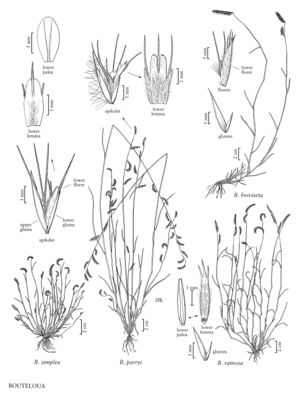Difference between revisions of "Bouteloua ramosa"
FNA>Volume Importer |
FNA>Volume Importer |
||
| Line 17: | Line 17: | ||
-->{{Treatment/Body | -->{{Treatment/Body | ||
|distribution=Tex. | |distribution=Tex. | ||
| − | |discussion=<p>Bouteloua ratnosa is locally common on rocky limestone slopes and flats among shrubs and Agave lecheguilla. Its range extends from the Trans Pecos region of western Texas to adjacent northern Mexico, particularly the state of Coahuila. Reeder and Reeder (1980) provide an excellent discussion of B. ramosa and B. breviseta.</p> | + | |discussion=<p><i>Bouteloua</i> ratnosa is locally common on rocky limestone slopes and flats among shrubs and <i>Agave</i> lecheguilla. Its range extends from the Trans Pecos region of western Texas to adjacent northern Mexico, particularly the state of Coahuila. Reeder and Reeder (1980) provide an excellent discussion of <i>B. ramosa</i> and <i>B. breviseta</i>.</p> |
|tables= | |tables= | ||
|references= | |references= | ||
| Line 38: | Line 38: | ||
|publication year= | |publication year= | ||
|special status= | |special status= | ||
| − | |source xml=https://jpend@bitbucket.org/aafc-mbb/fna-data-curation.git/src/ | + | |source xml=https://jpend@bitbucket.org/aafc-mbb/fna-data-curation.git/src/8f726806613d60c220dc4493de13607dd3150896/coarse_grained_fna_xml/V25/V25_900.xml |
|subfamily=Poaceae subfam. Chloridoideae | |subfamily=Poaceae subfam. Chloridoideae | ||
|tribe=Poaceae tribe Cynodonteae | |tribe=Poaceae tribe Cynodonteae | ||
Revision as of 17:35, 18 September 2019
Plants perennial; densely cespitose, bases hard, knotty, without rhizomes or stolons. Culms 25-60 cm, numerous, somewhat woody at the base, geniculate, branching profusely from the lower nodes; nodes usually 4-5; lower internodes glabrous, without a conspicuous, white, chalky bloom. Ligules 0.1-0.2 mm, of hairs; blades 2-7 cm long, 1-2 mm wide, mostly flat but the tips involute. Panicles 1-3(5) cm, with 1-3(4) branches; branches 10-35 mm, persistent, ascending to widely divergent, becoming arcuate, dark, with 24-45(64) spikelets, branches terminating in a reduced, needlelike, 2-5 mm spikelet; disarticulation above the glumes. Spikelets with 1 bisexual floret and 1-2 rudimentary florets. Glumes acute to acuminate, glabrous or sparsely short-hairy, hairs not papillose-based; lower glumes 2-2.5 mm; upper glumes 2-3.5 mm; lowest lemmas 2.5-4 mm, sparsely to densely hairy, 3-awned, awns slightly shorter than the lemma bodies, central awns flanked by 2 membranous lobes; lowest paleas about 4.5 mm, mostly glabrous, sometimes puberulent distally, acute to acuminate, veins not excurrent, unawned; second florets about 4.5 mm, 3-awned, awns 3-5 mm; rachilla segments subtending second florets with densely pubescent apices; third florets, if present, flabellate scales, 1-awned. Caryopses 1-1.2 mm long, about 0.4 mm wide. 2n = 40.
Discussion
Bouteloua ratnosa is locally common on rocky limestone slopes and flats among shrubs and Agave lecheguilla. Its range extends from the Trans Pecos region of western Texas to adjacent northern Mexico, particularly the state of Coahuila. Reeder and Reeder (1980) provide an excellent discussion of B. ramosa and B. breviseta.
Selected References
None.
